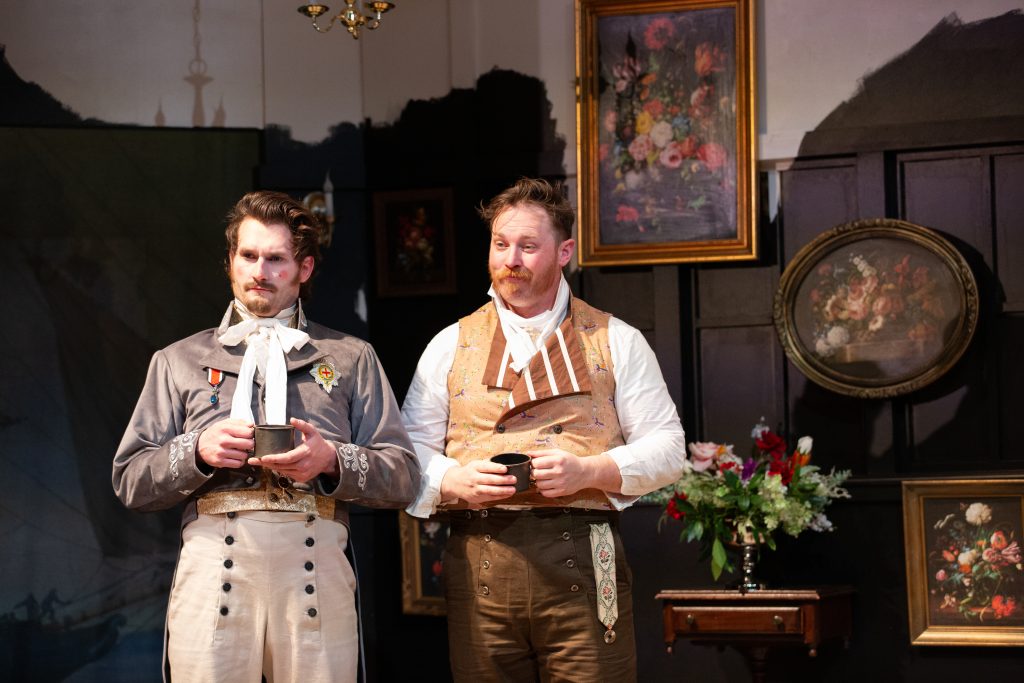
There’s a tendency of late for directors to re-envision Shakespeare’s masterworks by staging them in a different time and territory, and with a more modern temperament, as if today’s audiences needed an assist in finding the plays’ relevancy.
This misguided movement was recently touched on by satirical digital news source The Onion in a mock review of a community theater production of Shakespeare’s The Merchant of Venice and mock director Kevin Hiles’ bold choice to set it in 16th-century Venice, as originally intended. Says Hiles, “I know when most people hear The Merchant of Venice, they think 1960s Las Vegas, a high-powered Manhattan stock brokerage, or an 18th-century Georgia slave plantation, but I think it’s high time to shake things up a bit.”
Gamm Theatre shakes things up big time in its current production of the comedy Twelfth Night by boldly ignoring the play’s subtitle Or, What You Will and sticking instead to what it is – a merry romp with poetry and music, set at the turn of the 17th century on the coastal city of Illyria, featuring a love triangle between Duke Orsino, the Countess Olivia, and the Duke’s manservant, Cesario. It also features one of Shakespeare’s most endearing creations – the fast-talking, truth-telling fool, Feste.
At the start of the play, a pair of fraternal twins – Sebastian (Michael Liebhauser) and Viola (Alison Russo) – are separated by a shipwreck and carry on their lives thinking the other dead. Landing in Illyria, Viola disguises herself as a man for protection and to honor her brother, calling herself Cesario. She finds employment with Duke Orsino (Cedrick Lilly), with whom she secretly falls in love. The Duke is in love with the Countess Olivia (Donnla Hughes) and sends the crossdressing Viola to woo her on his behalf. The guarded Countess allows herself to fall in love with Cesario/Viola’s clever wordplay and then with the person uttering them. Later, when Sebastian happens into town, the Countess confuses him for Cesario/Viola, beds him, and weds him.
What’s particularly wonderful about this production is that even the most melancholic and dramatic moments in this brilliantly played central plot are infused with a pleasant effervescence, as if co-directors Tony Estrella and Rachel Walshe fully embraced Feste’s observation that “Foolery, sir, does walk about the orb like the sun; it shines everywhere.”
Weaving in and out of this storyline are scenes that contain some of the cleverest dialogue and funniest stage business found in Shakespeare’s canon. They feature the swaggering but mostly staggering Sir Toby Belch (Kelby Akin), his hapless sidekick and drinking buddy Sir Andrew Aguecheek (Jeff Church), and the fool Feste (Nora Eschenheimer). The actors’ comic timing and handling of the Bard’s dexterous language are impeccable. And the artistic and athletic physicality they employ to establish the true nature of their characters and amplify the humor they mine from the script is remarkable. I’ve seen performances at All-Shakespeare-All-The-Time playhouses, including London’s Globe Theatre, that pale by comparison.
All this is best on display when Malvolio (Deb Martin), the vain, pompous, and authoritarian steward of the Countess’ household, reads a letter of seduction supposedly written by the Countess, but which is actually penned as comeuppance by Olivia’s gentlewoman, Maria (Rachel Dulude). The whole thing is orchestrated by Sir Toby, Sir Aguecheek, and their playful companion Fabian (Jason Quinn), and abetted by Feste, all of whom lay in wait and watch.
Flattered and flabbergasted, Martin’s Malvolio obeys the letter to the letter. She smiles – a laborious, painstaking, and hilarious undertaking – and puts on hideous yellow stockings cross-gartered. When she encounters the Countess, a scene resembling the final moments of the film Sunset Boulevard unfolds, where the demented, wide-eyed, faded actress played by Gloria Swanson says, “All right, Mr. DeMille, I’m ready for my close up.” Watching that scene meticulously play out is worth the price of admission.
Patrick Lynch’s scenic design consists of two giant wooden crates on the boardwalk of Illyria’s dock, set against a painted backdrop of ships at sea. When fully open, the crates reveal furnished foyers that represent the homes of Duke Orsino and Countess Olivia, and facilitate entrances and exits. Everything is beautifully lit by designer James Horban and frequently accompanied by the haunting sound of seagulls courtesy of sound designer Hunter Spoede. Everyone wears perfectly character-defining costumes by David T. Howard.
Although this production stays true to the original work, it should be noted that female actors have been cast in the traditionally male roles of Malvolio and Feste. This does not seem at all out of place in a play so driven by the subterfuge of gender duplicity. Plus, Martin and Eschenheimer are flat-out brilliant.
Twelfth Night runs through April 14 at Gamm Theatre, 1245 Jefferson Blvd., Warwick. Contact (401) 723-4266, gammtheatre.org.
Bob Abelman is an award-winning theater critic who formerly wrote for the Austin Chronicle.